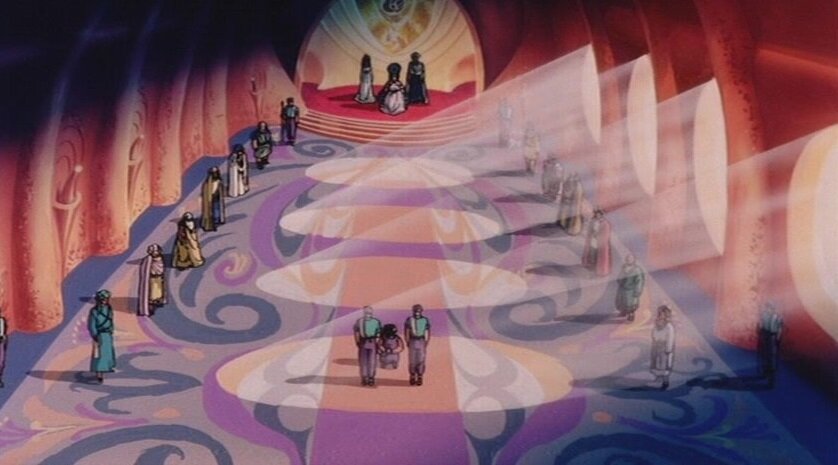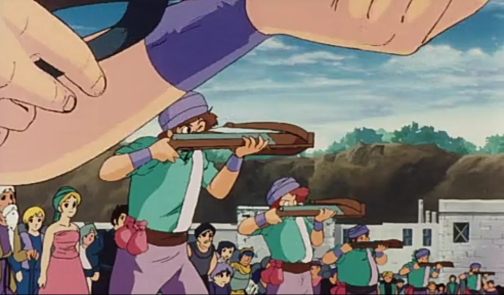An uneasy anime:Windaria


I‘m an optimist, believing in Positivity and that people can get along. But I can’t get self-blinded. I can’t avoid seeing flaws or a self-destructive mentality. For example, the mentality unfolding there in Windaria.
First things first. And let me quickly introduce you to the plot of this work, and then we will discuss in detail what you can expect from this story, and why I liked it so much.
Plot Synopsis
“The mountainous kingdom of Paro and the coastal city-state of Itha had been at peace for over a century. They would have remained that way but for the ambitions of Paro’s power-hungry king. Paro invaded Itha, despite the love between Jill, Paro’s prince, and Ahanas, Itha’s princess. Caught between duty and emotion, the star-crossed lovers were forced to fight a war to its bitter conclusion. Meanwhile, Isu was a simple farmer from the neutral village of Saki. Still, he saved Itha from being destroyed by a spy from Paro and found himself hungering for wealth and glory that the Ithan monarchy couldn’t provide. Agents from Paro made him an offer to fulfill his wishes, and he left his wife Marin behind in what would turn into a battlefield between the two kingdoms.”
Below: Izu and Marin


Our story begins with Izu and his wife, Marin, selling their vegetables in the capital city of Itha. While in town, a saboteur attempts to flood this city by opening the dikes. (Itha is very reminiscent of Holland with its dikes and windmills.) Izu thwarts this plan but receives scant recognition at the court Ithan for saving their capital, The royal court learns from the captured saboteur that Paro employed him, and they send the failed captured one back to Paro. They give their ultimatum: Paro should pay for the water it receives, or else…
See below:The scene of the captured saboteur

We can understand the emotions driving the strained relations between the two kingdoms and what triggers this senseless war: It revolves around the financial interests of Itha. They believe they can maintain their monopoly on water and subsequently increase the price. The mindset of “If you want it so much, you have to pay” is dangerously reckless.
It may be tempting to view Paro as a land of villains, or at least as a belligerent and irrational people. However, much of the blame lies with Itha. Their attempt to confront Paro without even the most basic firearms was not only unjust but also imprudent. They should have quickly recognized their mistakes and resorted to diplomacy, seeking friendship instead.


It’s important to remember that Prince Rolland of Paro and Princess Ahanas of Itha are in love. Their marriage could naturally unite the two nations and ensure normalcy and peace on both sides—a win-win situation. (Princess Ahanas is the Queen’s sole heir.) Despite being a military power, Paro’s soldiers suffer from a lack of discipline and training, leading to substantial casualties on the battlefield. Normally, soldiers armed with crossbows should not be able to inflict many casualties on those using tanks and fully automatic rifles.
If Itha truly wished to maintain their well-being and independence, they should have worked to achieve military parity with Paro, their neighbor with a history of conquest. Possessing powerful weapons—such as nuclear arms and advanced ballistic missiles—would have significantly changed the game. They also failed to consider the necessity of arranging covert operations.

How could they march into war without being interested in discovering the secret plans and capabilities of Paro? Why were they not curious about assembling a counterintelligence team? For instance, they should have focused on protecting their vulnerable water dikes. After experiencing prior sabotage, they should have understood the importance of having a safety and counterintelligence organization.

The subplot involving Izu’s decision to work for Paro is filled with tragedy. As their agent, he sneaks to the dikes, opens them, and causes a devastating flood, leaving his wife Marin behind in what would become a decimated city. Over time, he lives a life of luxury, unaware of his uselessness to them. When a girl, who is a would-be assassin, attempts to kill him, it shocks him and drives him to flee for his life. That’s when he finally comprehends the awful destruction he has caused.
What is not immediately clear is that Paro is not the villain of the story; they are burdened with high costs for the valuable water and are acting as realists who utilize espionage to achieve their goal of winning the war.
As you watch this unfold, you may justifiably wonder: How could Izu, or the people of Itha, including the court, be so foolish? How could they believe in a quick and easy victory in a war without powerful military technology? Unfortunately, Princess Ahanas was also influenced by this poor mentality and succumbed to her mother’s wishes: the destruction of the enemy, including her beloved Rolland.😦😱
Did you enjoy the article? You now have the chance to support the author and encourage him.

Hi, this is a comment. To get started with moderating, editing, and deleting comments, please visit the Comments screen in…